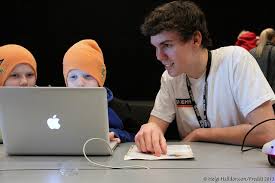Beyond exploring the imagination and enriching the lesson of foreign language, the exploration of the teatrais parts collaborates for the interaction of the pupil with the group, desinibindo it and stimulating the autoconfiana. To the times the professor if worries about the criteria to be observed when choosing the literary text for one determined group. Aebersold and Field (1997) suggest that: … for the election of the material, the professor must consider, as each group: cultural aspect, making possible the use of the previous knowledge of the pupil, this factor also is detached by Lazar (2005, p.14) when mentioning itself it ' ' literary background' ' , that is, the knowledge that the pupil presents regarding literature. Another aspect to be considered is the relevance of the subject for the life of the pupil, that is, to have in mind its interests, hobbies, intellectual maturity, and, finally, the used level of language, that is, the lingustica proficiency of the apprentice, which needs to understand, at least, the basic structures of the language. When oportunizar the access to the literary text in the English lessons, the professor also will be able to articulate the relation of this disciplines with others of the resume of Average Education, for example, Portuguese Language, Arts and History, considering activities or projects interdisciplinares that they contribute for the equity in the treatment of discipline of English Language in relation to excessively, making with that the pupil perceives that contents of you discipline distinct can to be related. CONCLUSION Already in attention what it was seen, perceives that the education of literatures, a priori, of English language, always assumes disappears importance, therefore beyond if developing the communication, the critical development of the readers, creating lingusticos mechanisms for the communicative interaction, it makes possible to same the o knowledge of a new culture only for the literary reading.
Recent Posts

Archives
- March 2024
- September 2022
- August 2022
- July 2022
- April 2022
- February 2022
- January 2022
- December 2021
- November 2021
- October 2021
- September 2021
- August 2021
- July 2021
- December 2020
- November 2020
- October 2020
- September 2020
- August 2020
- July 2020
- June 2020
- May 2020
- April 2020
- March 2020
- February 2020
- January 2020
- December 2019
- November 2019
- October 2019
- September 2019
- August 2019
- July 2019
- June 2019
- May 2019
- April 2019
- March 2019
- February 2019
- January 2019
- December 2018
- November 2018
- September 2018
- August 2018
- July 2018
- February 2018
- January 2018
- September 2017
- August 2017
- July 2017
- June 2017
- May 2017
- April 2017
- March 2017
- February 2017
- January 2017
- November 2016
- August 2016
- July 2016
- June 2016
- March 2016
- February 2016
- January 2016
- November 2015
- October 2015
- September 2015
- August 2015
- July 2015
- May 2015
- April 2015
- March 2015
- February 2015
- January 2015
- December 2014
- November 2014
- September 2014
- August 2014
- June 2014
- May 2014
- April 2014
- February 2014
- January 2014
- December 2013
- November 2013
- October 2013
- September 2013
- August 2013
- July 2013
- June 2013
- May 2013
- April 2013
- February 2013
- January 2013
- December 2012
- November 2012
- October 2012
- September 2012
- August 2012
- July 2012
- June 2012
- May 2012
- April 2012
- March 2012
- February 2012
- January 2012
- December 2011
- November 2011
- October 2011
- September 2011
- August 2011
- July 2011
- March 2011
- February 2011
- June 2010
- May 2010
- April 2010
- March 2010
- February 2010
- January 2010
- December 2009
- November 2009
- October 2009
- September 2009
- August 2009
- July 2009
- June 2009
- May 2009
- April 2009
- March 2009
- February 2009
- January 2009
- December 2008
- November 2008
- September 2008
- August 2008
- July 2008
- June 2008
- May 2008
- April 2008
- March 2008